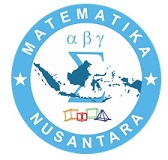KOMPETENSI STRATEGIS SISWA DALAM MENYELESAIKAN SOAL CERITA DITINJAU DARI TIPE KEPRIBADIAN
Abstract
ABSTRACT
Strategic competence is one of the components of mathematical proficiency to describe the students’ mathematics learning success. Strategic competence includes students’ effort to formulate suitable mathematical model and to solve mathematical problems with efficient methods. Personality types contribute to the problem-solving process. This qualitative research investigated strategic competence aspects of students with thinking personality when they solved math’s word problems. They were in the eleventh grade of high school in Jambi. This study aims to: 1) identify the strategic competence of students with thinking personality in solving word problems, 2) analyze the type of students errors in solving word problems, and 3) describe the causes of student errors in solving word problems. Firstly, MBTI (Myers-Briggs Type Indicator) personality test was given to find the personality type of each student. Furthermore, selecting three students who have thinking personality. Then students having thinking personality were given a strategic competence test in the form of word problems for topic of linear program. The causes of students errors in solving linear program problems were obtained based on the result of interviews with students. The results showed that; 1) students with thinking personality were classified in the category of good because these students were able to fulfill the three aspects of strategic competence in solving mathematical word problems, 2) there were 4 types of mistakes made by student with thinking personality, namely concept error, fact errors, principle errors and operation errors, 3) the causes of students’ errors were lack of understanding the prerequisite material for the material of the linear program, lack of thoroughness in solving word problems, lack of understanding the language of matter, and material often given by the teacher without being associated with daily life.
Keywords: Strategic Competence, Thinking Personality, Word ProblemsFull Text:
PDFReferences
Bachman, L. F. (2013). Fundamental Considerations in Language Testing (6th ed.). New York: Oxford University Press.
Creswell, J. W. (2007). Qualitative Inqury & Research Design: Choosing Among Five Approaches. (Edisi Kedua). California: Sage Publications, Inc.
Creswell, J. W. (2016). Research Design: Pendekatan Metode Kualitatif, Kuantitatif, dan Campuran. (Edisi Keempat). Yogyakarta: Pustaka Pelajar.
Fitria, T. N. (2013). Analisis Kesalahan Siswa dalam Menyelesaikan Soal Cerita Berbahasa Inggris pada Materi Persamaan dan Pertidaksamaan Linear Satu Variabel. MATHEdunesa, 2(1).
Gagne, R.M. & Briggs, L.J. (1979). Principles of Instructional Design. Second Edition; New York: Holt, Rinehart and Winston.
Hoffmann D, Mussolin C, Martin R, Schiltz C. (2014). The Impact of Mathematical Proficiency on the Number-Space Association. PLOS ONE 9(1): e85048. https://doi.org/10.1371/journal.pone.0085048
Jinkerson, J., Masilla, A., & Hawkins, R. C. (2015). Can MBTI Dimensions Predict Therapy Outcome: Differences in the Thinking-Feeling Function Pair in CBT. Research in Psychotherapy: Psychopathology, Process and Outcome, 18(1). doi:10.4081/ripppo.2015.167
Kemendikbud. (2016). Permendikbud Nomor 20 Tahun 2016 Tentang Standar Kompetensi Lulusan Pendidikan Dasar dan Menengah. Jakarta: Kementrian Pendidikan dan Kebudayaan.
Kilpatrick, J., Swafford, J., & Findell, B. (2001). Adding it Up: Helping Children Learn Mathematics. Washington DC: National Academy Press
Kroeger, O., & Thuesen, J. M. (1988). Type Talk at work. Bantam Doubleday Dell Publishing Group.
Lave, J. (2016). Word problems: a microcosm of theories of learning. (2016). Context and Cognition: Ways of Learning and Knowing. London: Routledge.
Mészáros, A., & Budavári-Takács, I. (2016). Correlation Between Leadership Effectiveness and Personality Preferences at a Hungarian Independent Financial Advisor Company. Practice and Theory in Systems of Education, 11(1), 62–70. doi:10.1515/ptse-2016-0009
Miles, Huberman, and Suldana. (2014). Qualitative Data Analysis. Los Angeles: SAGE Publication.
National Research Council (NRC). (2001). Adding It Up: Helping Children Learn Mathematics. Edited by J. Kilpatrick, J. Swafford, and B. Findell. Washington, D.C.: National Academies Press.
Özdemir, İ. E. Y., & Pape, S. J. (2012). Supporting students’ strategic competence: a case of a sixth-grade mathematics classroom. Mathematics Education Research Journal, 24(2), 153–168. doi:10.1007/s13394-012-0033-8
Ramalisa, Y. (2013). Proses Berpikir Kritis Siswa Sma Tipe Kepribadian Thinking Dalam Memecahkan Masalah Matematika. Jurnal Edumatica Volume 03 Nomor 01. ISSN: 2088-2157.
Sugiyono. (2013). Metode Penelitian Pendidikan Pendekatan Kuantitatif Kualitatif dan R&D. Bandung: CV. Alfabeta.
Suh, J. M. & Seshaiyer, P. (2014). Developing strategic competence by teaching using the Common Core Mathematical Practices. Annual Perspectives in Mathematics Education, 77-87.
Syukriani, A., Juniati, D., & Yuli, T. Adaptive reasoning and Strategic Competence in Solving Mathematical Problem: A Case Study of Male-Field Independent (FI) Student. Jurnal of Research, Implementation and Education of Mathematics and Science. ISBN 978-602-74529-0-9.
Supiyanto., Hendriana, Herris., & Maya, Rippi. (2018). Improving The Capabilities Of Strategic Competence And Mathematical Disposition Using The Inquiry Model Of Alberta Method. JIML, 1 (3), 218-224.
Tim psikologi. 2014. Babon Psikotes Paling Update. Jakarta: Visimedia.
Umam, M.D. (2014). Analisis Kesalahan Siswa dalam Menyelesaikan Soal Cerita Matematika Materi Operasi Hitung Pecahan. MATHEdenusa jurnal ilmiah pendidikan matematika, 3(3), 131-134.
Verschaffel, L., Greer, B., & De Corte, E. (2000). Making sense of word problems. Taylor & Francis.
Widdiharto, R. (2008). Diagnosis Kesulitan Belajar Matematika SMP dan Alternatif Proses Remidinya. Paket Pemberdayaan KKG/MGMP Matematika. Yogyakarta: P4TK Matematika
DOI: http://dx.doi.org/10.30870/jppm.v13i2.7291
Refbacks
- There are currently no refbacks.
Copyright (c) 2020 JPPM (Jurnal Penelitian dan Pembelajaran Matematika)
Ciptaan disebarluaskan di bawah Lisensi Creative Commons Atribusi 4.0 Internasional .
JPPM (Jurnal Penelitian dan Pembelajaran Matematika). Jurnal ini diterbitkan oleh Jurusan Pendidikan Matematika FKIP Universitas Sultan Ageng Tirtayasa (cetak) dan Jurnal Untirta (eprint).
Alamat Penerbit: Jl. Raya Ciwaru No 25 Kota Serang Banten, Jurusan Pendidikan Matematika, Fakultas Keguruan dan Ilmu Pendidikan, Universitas Sultan Ageng Tirtayasa, Kampus Ciwaru, Serang, Banten, Indonesia. Telepon / Faks: (0254) 280330 Ext 111, Email: jppm@untirta.ac.id |Klik untuk mengakses: Jurnal Penelitian dan Pembelajaran Matematika


